|
White Heat Prohibition Sextet Speaks Easy
Sherborn Inn, November 3, 2009
by Peter Gerler
photos by Frank Stadler
I
first heard the sound of Bix's Beiderbecke's cornet after college,
visiting a banjo-playing friend in Maine. His dad had the Columbia LP,
The Bix Beiderbecke Story: Bix and His Gang Vol. 1. We were just
in from the beach, wasted from the sun. His dad put on side one, and
"Jazz Me Blues" flowed into the room.
I went almost
dizzy, didn't know where to turn. The thing was
swinging, and I had never really heard that. It was like a first
orgasm. It seemed to go everywhere and nowhere at once.
Part of this was
the tempo—right down the middle. In Swing that Music, Louis
Armstrong wrote that swing "does not necessarily mean loud or even
fast." If you had never heard Louis' idea, you would have known it
anyway from Bix's playing. I would learn later that this idea was the
hallmark of early New Orleans jazz—loose, but tight. For the moment,
though, you could have knocked me over by blowing on me.
So when I received
notice that the White Heat Prohibition Sextet, featuring the music of
Bix and Benny Goodman, would appear at Sherborn Inn, it went to the top
of my inbox. I like Goodman, but it was Bix's music that pulled me.
I didn't read the
notice carefully, so when I saw that both Craig Ball and John Clark
would play with the group, I assumed (and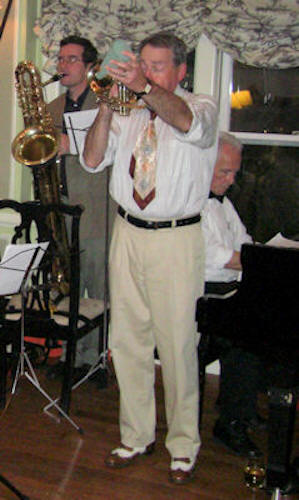 wondered about) two clarinets. But when I walked into the room, the
truth thudded into me—as it should have—from John's bass sax, which he's
played for about a year now. The man has covered the map when it comes
to reeds;
he plays clarinet, as well as tenor, baritone, and now bass saxophones. He also leads his own excellent Wolverine Jazz Band, teaches music at Connecticut College, and writes about jazz in a number of journals and websites.
wondered about) two clarinets. But when I walked into the room, the
truth thudded into me—as it should have—from John's bass sax, which he's
played for about a year now. The man has covered the map when it comes
to reeds;
he plays clarinet, as well as tenor, baritone, and now bass saxophones. He also leads his own excellent Wolverine Jazz Band, teaches music at Connecticut College, and writes about jazz in a number of journals and websites.
All of which fell
away at the sound of his bass sax. The instrument party-crashed many
early jazz bands—including those of Bix, Frank Trumbauer, Irving Mills,
and Fletcher Henderson. In
general, it sounds like a buffalo wandering through the
proceedings—making you move out of the way.
Jeff Hughes, wearing spectator
shoes and a wide 1930s tie, must have come from a Hemingway
novel—except there he was live, playing Bix's lines on cornet. How
good could this be?
Bix was called
the first great white jazz musician. His dressed-up tone and plaintiff
delivery could make you think about something else. You could tell his
sound like you'd know your own mother. Bix seemed to scream for
attention but didn't need it because he was happy anyway.
And now it seemed
as though Bix had dropped his music and Jeff had picked it up. Jeff
plays with color and voltage—a delight. Dubbed "Mr. Melody" by the jazz
radio personality Ray Smith, Jeff also leads his own trad jazz group,
"Lost in the Sauce," and plays with both the Wolverine and Paramount
Jazz Bands of Boston.
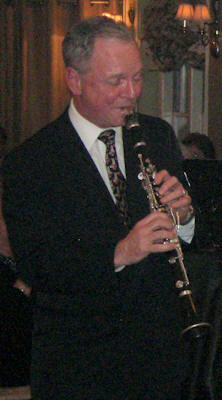 |
On clarinet, the high roller, the main man himself, we had the leader, Mr. Craig Ball (I think from now on I will call him "Mister"—he seems to own it.) For some time, Craig has made things work musically with his White Heat Swing Orchestra, named "Boston's Best Dance Band" by
Boston magazine. As house band, they held forth at the Roxy for five years. They've backed up Tony Bennett and Norah Jones and did the sound track for
Dick Tracy (the movie). Craig has definitely learned a thing or two from Benny Goodman. His small, hot group at Sherborn stood second cousin to his big band.
I've been privileged to gig with Craig more than once, and the man is a joy to accompany. His fire and force kick up my guitar rhythms. Melody-wise, I'd follow him into the Grand Canyon. As for his jokes, I'll run screaming into the street.
This night, I
arrived late. But to my glee, the second set opened with one of my
all-time Bix favorites, "Sorry," recorded with the Wolverines in October
1927. In addition to Bix, that session had Adrian Rollini on bass sax,
and the indefatigable Don Murray (who doubled on baritone) knocking open
the piece with a clarinet variation—which you just knew was a setup, an
emcee's intro to the main attraction. Bix would pick up the ball and run
through the end zone into the next week. |
Tonight,
Craig brought Don Murray's feeling as he led off, Jeff delivered Bix's
exact thematic line, and the tune came to life. It featured an intimate
duet between Craig and the rootsy swing guitarist Eric Baldwin, playing
the traditional unamplified box. The 32 bars echoed the legendary duets
between Eddie Lang and Joe Venuti. It was all improvised, of course, but
as Frank Sinatra noted, “Jazz is about the moment you’re in. Being
modern’s not about the future, it’s about the present.”
|
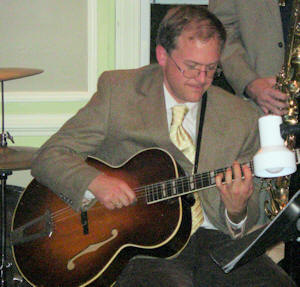 |
Eric later played
a lovely parlor waltz, Eddie Lang's "April Kisses"—again on his acoustic
Gibson guitar. The homelike, pre-ragtime construction took one back to
the 1890s.
|
|
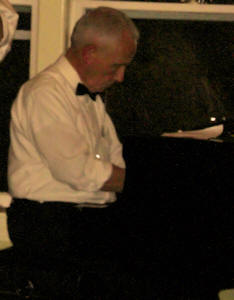 |
The night included
impressive contributions from pianist Robin Verdier and drummer Dave
Bragdon. Covering the Paul Whiteman/Bix/Lang/Venuti 1928 recording of
"San," the sextet clipped along at highway speed, Robin holding the
pieces together with tight chords. Later, he played an angular
impression of Jelly Roll Morton's "Freakish," a Halloween piano rag. And
on "Tiger
Rag," he more than admirably duplicated Morton's elbowing "tiger" sound.
This tune evolved from the "proper" schottische dance, common in early
New Orleans; appropriately, the group sent it off in straight dance time. |
|
Dave Bragdon is
this writer's choice for among the best of local New Orleans drummers.
For one thing, he understands the function of the press roll—a
fundamental in military/brass band repertory and in the Crescent City
"parade beat." New Orleans brass bands played a key role in the birth of
jazz. Dave's handiwork turned up in the group's take of Bix's chestnut
"I'm Coming Virginia," where he throbbed behind a clarinet/guitar duet.
|
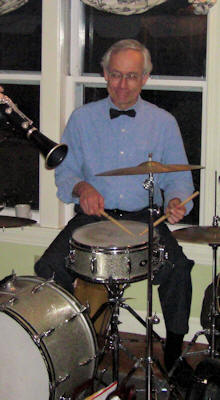 |
The night ended
with a favorite swinger of mine, Bing Crosby's "From Monday On." He did
it with Paul Whiteman in early 1928, singing sweet harmony with his
Rhythm Boys, Bix in the background. Although the sextet's arrangement
included no vocal, I could still hear the lyric:
From Monday on,
my cares are over
From Monday on, I'll be in clover….
And that's the way
everyone seemed to feel in Sherborn, this Tuesday night!
###
Peter Gerler
can be reached at
pgerler@verizon.net
|
BACK TO TOP |
| Updated
November 12, 2009
|
|